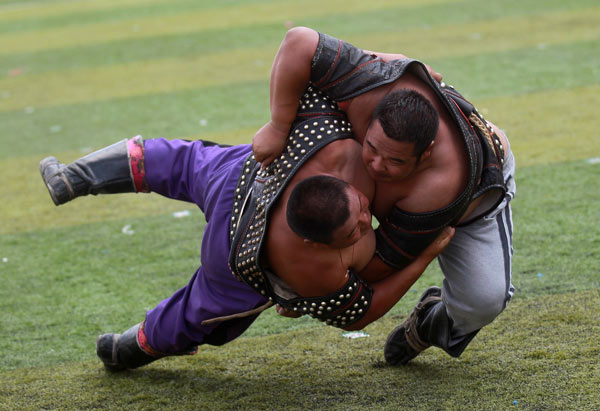One-time nomads hang on to traditional celebrations
Updated: 2013-08-28 07:35
By Zhang Yuchen in Xilinhot, Inner Mongolia, and Yang Fang in Hohhot (China Daily)
|
|||||||||||
The celebrations, which are sometimes known as the "three games of man", are celebrated across the length and breadth of Inner Mongolia. As summer reaches its midpoint and the breeding season comes to an end, the nomads will gather together, just as long as there are games and contests, however big or small.
Unlike their ancestors, those in attendance nowadays usually arrive in vehicles rather than on horseback. Horses are now usually only used for grazing or shepherding the flocks.
Taivanhuar, 34, the head of Bulgan Sumlin Yalalt Gacha, an administrative division equivalent to a village, remembered the days when he rode on horseback to visit his neighbors. "Everyone on the grassland, male or female, old or young, is a good rider, so this is a celebration of the nomadic people," he said, adding that the festivals also draw an increasing number of tourists.
However, this nomadic group is gradually settling down and most people now live in permanent dwellings. China's 12th Five-Year Plan (2011-15) aims to settle the nomadic population, around 1.16 million people, remaining on the 400 million hectares of grassland by 2015.
Despite the lifestyle changes, the people are attempting to continue living in strict accordance with tradition, including cultural events such as Nadaam, which have been listed by the Ministry of Culture as important aspects of the region's intangible cultural heritage - which includes songs, music, drama and handicrafts. Each Nadaam mainly consists of the "three games" that are still practiced daily, even though their popularity has declined slightly in the past few decades as modernity has encroached on the traditional lifestyle.
Related Stories
Expert calls for adjusting investment mode in Mongolia 2013-08-23 21:13
19 killed in N China rainstorms 2013-08-23 11:41
Mongolia in the making: Chinese investment there 2013-08-16 10:41
Ethnic costumes tournament held in Inner Mongolia 2013-08-10 10:23
Aviation festival to be held in N China 2013-07-26 13:54
Ancient Xanadu still amazes 2013-07-21 09:35
Today's Top News
Sino-Japanese meeting at G20 ruled out
Japan coast guard seeks more money
Party's plenum to focus on reform
Industrial sector's profit picture brightens
Rich Chinese eye overseas properties
New time limits for visa processing
China joins global effort to combat tax evasion
Chinese negotiator in DPRK
Hot Topics
Lunar probe , China growth forecasts, Emission rules get tougher, China seen through 'colored lens', International board,
Editor's Picks

|

|

|

|

|

|






